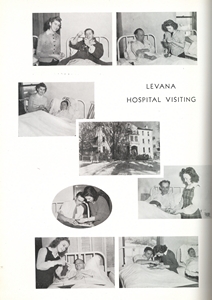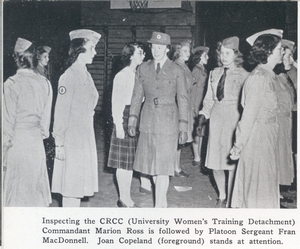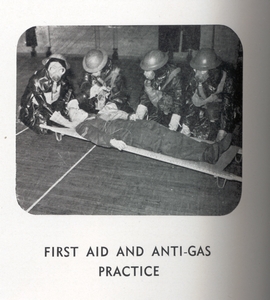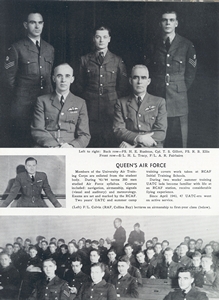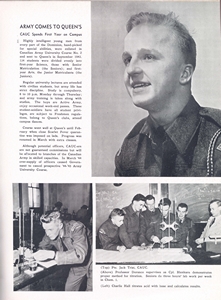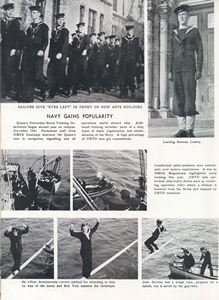
Queen's Remembers: The Second World War
- The University's Response
- COTC at Queen's
- Women and the War
- War Aid Commission
- Principal's Report 1940-41
- Principal's Report 1943-44
- WWII: Lives lost
The University's Response
The University's approach to the events of 1939 was generally cautious - not only because of the confusion that existed about the nature of the national commitment, but also because all were convinced that the war would be a long and costly one. "Now Canada is at war." said Wallace, "The temper of the nation shows that it is not likely to be a short or easy struggle; rather it will, in all probability, be grim and prolonged." Unlike 1914, young men in 1939 were well aware of the exigencies of war, and their response was of necessity much different. The editorial by Peter Macdonnell in the November 7th, 1939 Queen's Journal was reflective of the general mood of the student body when it stated:
"This time it is different. When people go to war this time they have some idea what they are going to; they expect not romance and high adventure but discomfort, drab weariness, suffering, death. Nor are they very sure that the world will become Utopia even when the war is won. They only feel sure that the war must be won if the things we value are to be preserved, though they sometimes fear that a second great war may wreck our civilization whoever are the victors. … Those who are giving up long-cherished plans and are preparing to do their bit in this struggle are showing the highest kind of courage, the kind that recognizes all the dangers it is going to meet and yet resolves to meet them, with little enthusiasm and no heroics it is true, but with steadfastness and determination."
Canadian Officers' Training Corps at Queen's
The COTC was an important influence in the life of many Queen's students. The announcement just before registration in 1939 that COTC training would count as an academic credit precipitated a sizeable influx of students into the Contingent. Unfortunately, while over 800 students enrolled, permission had not been granted beforehand for an increase from the former establishment of 246 cadets. Numerous letters were sent to Ottawa requesting permission for all 815 cadets to be allowed to write the qualifying examination and thereby obtain the academic credit. After some delay, permission to increase the size of the Contingent was granted by the Chief of the General Staff, with the stipulation that those accepted in excess of the original enrolment not be paid. Enlistment, which peaked at 842 in November 1939, finally levelled off at 648 for the session. Notwithstanding shortages of equipment, uniforms, and instructional materials, students enthusiastically enrolled for military training in five major areas: Artillery (201), Engineering (224), Signals (20), Infantry (144) and Field Medicine (33).
Women and the War
Dean Douglas addressed women students early in the term [1940] in an effort to focus their participation in the Queen's war effort. 'Women are not called upon to drill,' she began 'but they should do their part.' Once again, stenography, first aid, and home nursing were mentioned, and a Red Cross Room was proposed for Kingston Hall where female students could knit and roll bandages together. In concluding her remarks, Dr. Douglas "urged every girl to realize her responsibilities in disciplining mind and will. In so doing she may help rebuild the future."
The Queen's detachment of the Women's Voluntary Service Corps was formed in early 1941 with an enlistment of about 30 women, [its] future was ensured in September 1941 when Dean Douglas outlined in fairly forceful tones the available work for women, and the Senate decided that a minimal amount of female participation in the war effort would be mandatory. First year women were required to enroll in the St. John's Ambulance first-aid course, while Upper-year women who hoped eventually to enlist in the Women's Auxiliary Army or Air Force Corps were urged to enter the Women's Corps; others were encouraged to do hospital visiting and Red Cross work.
Direct involvement of Queen's women in military-related activities during the 1941-42 session was on the whole a success, with enrolment a respectable 124 in first aid and 60 in the training detachment. With most co-eds participating in Red Cross work and hospital visiting as well, Dean Douglas' comment that "there…[is] no question of the world's need of women's services, particularly in wartime", was to prove more and more correct as the conflict wore on.
Queen's War Aid Commission
Queen's War Aid Commission (QWAC) was the fund raising body of the students on campus. The first fund raising scheme went into effect before the end of the winter term of the 1940-41 session: War Aid Stamps, to be affixed to all mail, were placed on sale on December 6, 1940. At a cost of only one cent, no argument of financial stringency could excuse the participation of any student in this particular plan. The stamp campaign had a dual benefit, as well: while stamp sales raised money for the war effort, their use was evidence to the rest of the community of the University's active involvement. Yet another campaign involved the collection of old magazines and books for redistribution to military personnel based at Barriefield.
In January 1941, the QWAC set students a definite objective in the hope that this would increase their efforts to gather funds. In addition to their donations to the Red Cross, The War Aid Commission decided to purchase a field ambulance worth $1400. Although the AMS had "previously decided that an ambulance was too high an objective for Queen's and that the QWAC had 'put the AMS on the spot' by adopting it as an objective," the Journal staff enthusiastically endorsed the plan and called for a real effort to give "all-out aid". To ensure success, the AMS endorsed a personal subscription campaign involving the distribution of special "Ambulance Drive" envelopes to each student. The response was such that by March 7, 1941, the treasurer reported a total of $1,443.48 in the Ambulance Fund, an accomplishment that represented one of the major fund-raising successes of the QWAC.
The Repercussions of the War - Principal's Report 1940-41
After consultation with the Departments of National Defence and of War Services, the universities of Canada established compulsory military training for all students of eighteen years or over, who are of British citizenship. At Queen's, as at December 31st, 1252 men were taking training, 849 in the C.O.T.C. and 403 in the auxiliary battalion. Six hours per week have been taken up in drill and lectures, and in the case of the C.O.T.C. the time has on occasion been considerably greater. The women students have been engaged in Red Cross work, and in first aid and women's auxiliary service training. The War Aid Commission has had various devices for raising funds for a fully equipped ambulance - public lectures by prominent Canadians, novelty booths and sale of corsages at dances, and other ingenious methods of extracting funds from a not-too-affluent clientele.
The intercollegiate sports programme has been discontinued, and interfaculty sports, which are much less time-consuming, have been fostered in order to maintain the values which come from active participation in a healthy sports programme. Some of the glamour and excitement which accompanies the rivalry of the universities on the football field has been missing; but the time of students has been so heavily taken up in military activity that it would have been very difficult, had it been advisable, to carry on effectively in inter-university meets this year.
Under the strenuous conditions which they have had to face, the temper of the student body merits high praise. This has not been an easy year. Afternoons or evenings have been taken up in military or other war work. There has been little time for the organizations which form an important part of student life and education. Yet they have continued to function, even if in more limited sphere of activity. Practically to a man, the men students of eighteen years and over have fulfilled their military requirements, which have been rigidly administered in accordance with the understanding with the Government. The high quality of the courses of instruction given under the direction of Col. Earl as officer commanding, with Col. Jemmett as officer in charge of instruction, has made the administration of the compulsory training plan an easy task. No student at Queen's has refused to take the training, and, with only two or three exceptions, the students of eighteen years of age and over have completed the 100 hours of instruction laid down in the syllabus.
The call on members of the staff has been heavy and insistent. Sixteen faculty members have obtained leave to give their time to military service or war work. Several others have been partially relieved from their duties, to give part time to war work, while very many are giving all their spare time to war work, while very many are giving all their spare time to one form or other of national service. Special courses have been established. In electrical engineering and physics, a senior year group has been trained specially in communication and radio direction finding for the needs of the services, and a special course on radio direction finding will be given at the request of the Government during the summer months. Members of the Medical Faculty have given courses for medical officers of the units in the district on medical and surgical problems related to the war. The extramural service of Queen's University has been made available to officers and men in the Active Service Forces whether in Canada or overseas, in order that, when time is available, they may continue the studies which have been interrupted on enlisting for service. In several laboratories special research is being carried on, some of which is of a highly confidential nature, to meet the problems which the war has created. The call for members of staff and for students is becoming more urgent as the war needs grow more pressing. There is little doubt that the University will face next year grave difficulties, which will make our present problems seem insignificant. They will be part of the sacrifice we should pay - and pay gladly - in the cause for which the people of Britain are displaying a heroism and an endurance to which no tribute of words can do adequate justice.
War Work - Principal's Report 1943-44
The war goes on, and with increasing intensity. There are inevitable repercussions to the university. Fewer and fewer men are going on to senior years in arts, and those who do go on are in the main in the lower physical categories, unless they are specializing in the sciences. The total attendance is over three hundred below our maximum registration, and the decrease is mainly in the registration of arts men. All physically fit men students take training under the Canadian Officers' Training Corps, the University Air Training Corps, or the University Naval Training Division. A continuous stream of young men pass through our halls under the Royal Canadian Air Force. They are given a six weeks' course in mathematics and physics under their own officers in our lecture rooms and laboratories. They are quartered in the gymnasium. Last autumn 135 men were admitted who had been specially selected by Army authorities to take a year's training in scientific subjects. They have enlisted in the Army, and are in uniform and under Army pay. Seventy-two have senior matriculation standing, and are taking the regular work of the first year in applied science. Sixty-three have junior matriculation standing, and are in first year arts in a curriculum made up mainly of science subjects. After five weeks of additional training in subjects of special military significance these men will be absorbed into technical branches of the Army. They are quartered in the basement of Kingston Hall and have their meals, as have the R.C.A.F. men, in the basement of Grant Hall.
The University Training Detachment, Canadian Red Cross Corps receives training which fits women to enter any one of the three women's services. They are given basic drill and instruction from others in the Navy, Army and Air Force. They take their training in Grant Hall. An increasing number of our women graduates and undergraduates are selecting the women's services, and the training in the C.R.C.C. is helpful in making the decision. During the first term as well all the women students have taken a course in nutrition and health; and in the second term the first year students have taken the St. John Ambulance Association course in home nursing. Every undergraduate women registers for voluntary work in one or other of a variety of activities - Red Cross work, hospital visiting, Girl Guide leadership, business training, serving in soldiers' canteens, and the like - for at least two hours per week. The women of the university are doing a fine service in war work.
Research work in war problems is carried on in ever increasing amount. As it is practically entirely secret work, no statement can be made about it, other than that some of the work has proved to be of great value. The work is financed by the Dominion Government, in the main through the National Research Council. Very material financial assistance comes to Queen's University in this way.
There is a sense of strain, and of overwork. But that is not peculiar to universities. No one is living a normal well poised life in these times. Until the war is over, until victory is won, and until the problems that must be met at the close of the war are on the way to a reasonable solution, we shall all work under a load. As compared with the responsibilities that are carried by business men under the stress of war, our load is light. It is our responsibility to endeavour to see farther into the future, and to strive, through education and training, to prepare young men and women - and older men and women too - for the task that lied ahead.
World War II: Individuals who lost their lives
Each of these individual files were kept by the War Record Committee of Queen's University. They contain information regarding those staff, students, alumni and faculty who died in service during the Second World War. The files generally include military service cards and rolls, obituaries and photographs, although some files may also include clippings from the Queen's Review or other sources.


